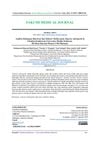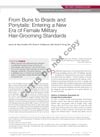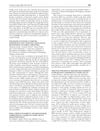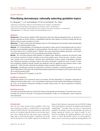 August 2024 in “International Journal of Molecular Sciences”
August 2024 in “International Journal of Molecular Sciences” Androgenetic alopecia involves immune cell disruptions, especially increased CD4+ T cells around hair follicles.
 3 citations,
August 2019 in “Journal of The American Academy of Dermatology”
3 citations,
August 2019 in “Journal of The American Academy of Dermatology” Higher doses of spironolactone may improve acne in PCOS patients, but side effects are a concern.
 5 citations,
May 2019 in “Cureus”
5 citations,
May 2019 in “Cureus” Taking biotin supplements can cause incorrect thyroid test results, leading to wrong diagnoses.
 October 2024 in “Skin Appendage Disorders”
October 2024 in “Skin Appendage Disorders” PRP is popular for hair restoration but needs better research methods to confirm its effectiveness and safety.
 27 citations,
April 2019 in “Journal of The American Academy of Dermatology”
27 citations,
April 2019 in “Journal of The American Academy of Dermatology” Where melanoma is on the body affects survival chances; melanomas on the back of the head are worse, while those on thighs and arms are less severe, and more sun exposure might improve survival.
 15 citations,
January 2019 in “Gynecological Endocrinology”
15 citations,
January 2019 in “Gynecological Endocrinology” The article concludes that global standardization in PCOS research is crucial for accurate diagnosis and understanding of the condition.
April 2023 in “Andrologia” American men are older, more obese, and have longer infertility than Canadian men.
 197 citations,
January 2019 in “Neuropsychopharmacology”
197 citations,
January 2019 in “Neuropsychopharmacology” Male and female bodies respond differently to stress, influenced by hormones and development stages, with implications for stress-related diseases.
 8 citations,
January 2015 in “World Journal of Gastroenterology”
8 citations,
January 2015 in “World Journal of Gastroenterology” Hair loss is common in IBD patients, and some medications may lower the risk.
 16 citations,
March 2019 in “Experimental dermatology”
16 citations,
March 2019 in “Experimental dermatology” Injury changes how hair follicle stem cells behave, depending on the hair growth stage.
Digit ratio likely doesn't predict male hair loss.
February 2023 in “European Journal of Medical Research” Certain existing drugs, like glycopyrronium and botulinum toxin type A, may help treat excessive sweating.
2 citations,
May 2022 in “International Journal of Impotence Research” Finasteride may be linked to Peyronie’s disease, but more research is needed.
November 2021 in “Evidencia” Young patients using finasteride may have higher risks of anxiety, depression, and suicidal thoughts.
 July 2022 in “Fakumi Medical Journal”
July 2022 in “Fakumi Medical Journal” There is a significant relationship between androgenic alopecia, hypertension, and diabetes mellitus.
1 citations,
December 2019 in “Journal of skin and stem cell” PRP shows promise for short-term hair growth, especially in young men.
Finasteride use is linked to a higher risk of obstructive sleep apnea.
 91 citations,
December 2017 in “Systems Biology in Reproductive Medicine”
91 citations,
December 2017 in “Systems Biology in Reproductive Medicine” Lower SHBG levels may increase the risk of PCOS.
 October 2023 in “Al-Anbar medical journal”
October 2023 in “Al-Anbar medical journal” The clinic-based hair fall count method is accurate and reliable.
 9 citations,
February 2018 in “Forensic Science International”
9 citations,
February 2018 in “Forensic Science International” The study could not confirm if Victor Vinnetou was Mbuyisa Makhubu and suggested more evidence, like DNA tests, is needed.
 3 citations,
July 2021 in “Cutis”
3 citations,
July 2021 in “Cutis” New military hair rules for women promote inclusivity and prevent hair damage.
 221 citations,
January 2014 in “Human Reproduction”
221 citations,
January 2014 in “Human Reproduction” Adding anti-Müllerian hormone to PCOS criteria lowers the number of women diagnosed.
 1 citations,
April 2021 in “Clinical and Experimental Dermatology”
1 citations,
April 2021 in “Clinical and Experimental Dermatology” The COVID-19 pandemic has caused a 57% increase in interest in facial cosmetic procedures, leading to calls for better industry regulation and professional standards.
 November 2022 in “Innovation in aging”
November 2022 in “Innovation in aging” Older adults in Puerto Rico often couldn't be tested for hair cortisol due to refusal or lack of hair, with race and hair products affecting results.
 152 citations,
October 2010 in “Archives of Dermatology”
152 citations,
October 2010 in “Archives of Dermatology” Finasteride helps hair growth but may cause sexual side effects.
 3 citations,
August 2014 in “Journal of The European Academy of Dermatology and Venereology”
3 citations,
August 2014 in “Journal of The European Academy of Dermatology and Venereology” Dutch dermatologists prioritized skin conditions like melanoma and psoriasis for guideline development, focusing on consistent care over cost or death rates.
 September 2022 in “Journal of The American Academy of Dermatology”
September 2022 in “Journal of The American Academy of Dermatology” Different types of hair loss are linked to COVID-19, with some types possibly increasing risk of getting the virus, while others may be triggered or worsened by the virus.
 1 citations,
October 2023 in “Romanian Journal of Morphology and Embryology”
1 citations,
October 2023 in “Romanian Journal of Morphology and Embryology” COVID-19 can cause various skin issues, but long-term skin problems are rare.
 121 citations,
April 2008 in “The Journal of Clinical Endocrinology & Metabolism”
121 citations,
April 2008 in “The Journal of Clinical Endocrinology & Metabolism” Insulin sensitizers may slightly reduce hirsutism but are less effective than other treatments.
 29 citations,
February 2016 in “International Journal of Dermatology”
29 citations,
February 2016 in “International Journal of Dermatology” People with lichen planus are more likely to have dyslipidemia, especially higher triglyceride levels.























